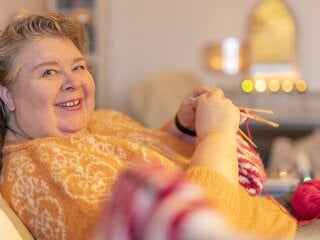In autumn 2022, there was something on Juha Kuusniemi’s MRI scan that looked possibly sinister.
“The hip had a faint, foggy patch, like a galaxy in space. The radiologist said that it could be a metastasis,” he says.
Juha was diagnosed with prostate cancer in December 2021. In the autumn 2022 check-up, the radiologist also spotted something unusual in his ribs.
“These findings together were an indication that the cancer had possibly spread. With cancer, there are hardly any certainties.”
This is also the thought that summarises Juha’s experience with cancer and the way he has come to terms with it.
No symptoms of prostate cancer
Juha’s cancer was discovered by coincidence. In autumn 2021, he sought medical attention for suspected lower levels of testosterone. This proved to be the case and Juha received a testosterone injection.
During a follow-up, it was discovered that his PSA level was elevated. The digital rectal examination confirmed that there was an abnormality in the prostate. Juha has never showed any symptoms indicating prostate cancer, before or after the examination.
“The doctor concluded that one plus one is two, which meant that it was highly likely that I had prostate cancer.”
The diagnosis was later confirmed.
The illness created a hunger for knowledge
After receiving the diagnosis, Juha started reading widely about the disease. Research articles available online gave him a good picture of what prostate cancer was all about.
Juha admits that while studying the articles he even experienced some new joy of learning. He is an upper secondary school teacher by profession, so reading and learning are second nature to him.
“With hindsight, such moments of enthusiasm were possibly also a sign of shock and denial,” he now concludes.
The worry began to build up when it turned out that the cancer could not be operated on as planned within a few months of the diagnosis and the surgery had to be postponed. This was a scary prospect for Juha.
Once the operation could be carried out, the entire tumour was successfully removed. Yet, three months after the operation, the PSA level was still elevated. This was an indication that the cancer had spread. However, the location of metastases is impossible to predict with any certainty.
Cancer diagnosis started a new chapter in life
Cancer diagnosis marked the beginning of a new chapter, or a new book, in Juha’s life.
“Everything that my life had been made up of until then disappeared and was replaced by new things. At the moment, I concentrate mainly on work and a few close relationships.”
Everything that my life had been made up of until then disappeared and was replaced by new things.
But Juha does not appear hopeless or despondent. He approaches his diseases with curiosity and an open mind. This attitude has helped him come to terms with the diagnosis.
Juha continued working as long as he could, against the advice of his occupational physician. He stopped working only once the radiotherapy started.
“The way I saw it, it was better to keep busy than to stay home and mull over all the unknowns that the possible metastasised cancer involved.”
An open mind and curiosity saved the day
The only thing that Juha knows for certain about cancer is that with cancer there are no certainties.
“All we know is how things appear at the moment, and then we may need to try something else. It is not the fault of the doctors; it’s the nature of cancer. There are various therapies and methods that can be tried and then we just wait and see if it works.”
To accept this, Juha has found it helpful to keep up the open-minded and curious attitude that he has towards everything in life. He has also taken comfort from pondering the fundamental questions of life.
For example, he has found solace in the idea that the self or human identity is false.
“The idea that I was once born and will one day die is untrue. I, the trees in the forest and the squirrels are all part of the same being and I most certainly am not the centre of that universe. Therefore, nobody is truly born or truly dies,” Juha philosophises.
Peer support is priceless in cancer treatment
Juha emphasises the importance of peer support.
“Life changes with an illness such as cancer, and the only way to process the emotions that come with it is to talk about them with someone who has been through the same experience,” he says.
Life changes with an illness such as cancer, and the only way to process the emotions that come with it is to talk about them with someone who has been through the same experience.
Juha chats on Facebook groups, where he has met similar, working-age cancer patients. He finds their support invaluable. The experience of cancer is very different depending on whether the patient is in their 50s or 80s.
Juha wants to say to all those who have received a cancer diagnosis that no two cancers and no two sufferers’ reactions to the diagnosis are the same. Everyone’s experience and path is unique.
No ready-made or certain answers exist, but we can support each other in searching for answers.
Juha Kuusniemi’s tips for people living with cancer
- Remember that every cancer is different. The fact that someone has had a certain experience or that their diagnosis led to a certain outcome does not mean that the same will happen for others with the same diagnosis.
- Appropriate peer support is helpful. For example, on Facebook, it may be useful to join English-speaking peer support groups. This way you can find others who are at a similar stage in life or cancer journey.
- Nothing is certain with cancer. This means that there is hope even in the most hopeless of situations.











